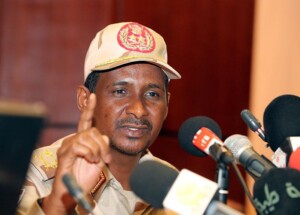Former Sudan FM: African countries hosting Hemedti ‘to spite El Burhan’

South Africa President Cyril Ramaphosa receives RSF Commander Mohamed 'Hemedti' Dagalo (Photo: X account of Hemedti)
The official reception and hospitality received by Rapid Support Forces (RSF) commander ‘Hemedti’ during his Africa tour raised many questions – and criticisms – about its significance, especially among the Sudanese government, the Sudan Armed Forces (SAF), and their supporters.
After a prolonged absence from the public eye, Mohamed ‘Hemedti’ Dagalo, the commander of the RSF, embarked on an Africa tour encompassing six countries, including four from the Intergovernmental Authority on Development (IGAD).
Hemedti first visited the Uganda on December 27, before continuing on to Ethiopia where he met with PM Abiy Ahmed. The RSF commander also sat with Kenyan President William Ruto, and President of Djibouti Ismail Guelleh, IGAD chair, and the heads of state of South Africa and Rwanda.
In an interview with Radio Dabanga on Wednesday, former Sudanese Foreign Affairs Minister Ibrahim Ayoub emphasised that these receptions were “not intended to celebrate Hemedti but rather to offend SAF Commander Abdelfattah El Burhan and his supporters.” Ayoub suggested that these countries may have welcomed Hemedti with official receptions “to spite El Burhan”.
Ayoub criticised these receptions as “incorrect in terms of protocol,” highlighting doubts about such an official recognition of the RSF commander “even if it came within the framework of Hemedti as the vice-president of the Sovereignty Council”.
He added that the actions of these African countries “might be a response to El Burhan’s attempts to circumvent IGAD efforts” to solve the conflict.
Relations between the Sudanese government and several IGAD countries have been strained since the outbreak of the war between the army and the RSF. Last June, Sudan’s Sovereignty Council, chaired by El Burhan, declared that “Kenya is not neutral and is home to RSF rebel leaders.”
Last week, acting Foreign Affairs Minister Ali El Sadig announced that Sudan summoned the Kenyan ambassador to protest against the official reception of Hemedti by the Kenyan president.
In an address to the Sudanese people on December 31, Sudan’s junta leader Lt Gen Abdelfattah El Burhan lashed out at countries that received Hemedti on his current tour, accusing them of “partnering in the crimes committed by these murderers”.
Negotiations
Former FM Ayoub believes it is “better to focus on the Jeddah platform and Saudi-US efforts in this file”, arguing that Saudi Arabia and the United States have greater leverage to pressure both sides of the conflict in Sudan. They are, according to Ayoub, “more committed to Sudan’s security and stability than some IGAD countries, which may not desire Sudan’s stability”.
IGAD “has not and will not make progress in stopping the war in Sudan,” Ayoub said, and added that it lacks the powers or mechanisms to hold accountable those who refuse to abide by any agreement. “In contrast, Saudi Arabia, the United States, and the European Union possess more power to impose their will.”
The former FM says that sanctions imposed by the United States and Europe can “serve as a potent pressure point to facilitate peace in Sudan”.
During the IGAD session on Sudan in Djibouti on December 9, the member states agreed to redouble efforts for a peaceful resolution to the ongoing war between the SAF and the RSF, including organising a one-on-one meeting between the two warring heads.
‘Diplomatic breakthrough’
For his part, Sudanese journalist and political commentator Mohamed El Asbat told Radio Dabanga that Hemedti “has successfully secured significant diplomatic advancements” in his Africa tour. He asserted that “these accomplishments can be strategically leveraged to Hemedti’s credit”.
Emphasising Hemedti’s “longstanding investment in diplomatic relations across the African continent”, the analyst considers the RSF commander’s visits “balanced and successful”. He noted a perceived diplomatic isolation faced by El Burhan, contrasting it with Hemedti’s “adept navigation of diplomatic engagements in diverse African nations.”
In September last year, the SAF commander visited several neighbouring countries and Turkey, in a bid to coordinate “initiatives to address the Sudanese crisis”.
SPLM-N El Hilu
The Sudan People’s Liberation Movement-North (SPLM-N) faction led by Abdelaziz El Hilu seeks to add seven issues to the agenda of an upcoming meeting with the Civil Democratic Forces (Tagaddum).
As reported by Radio Dabanga yesterday, Tagaddum invited hold-out rebel movements and political parties in Sudan for an urgent consultation meeting about the building of a broad democratic civil front against the ongoing war.
Adel Shalouka, the media head of SPLM-N El Hilu, told Radio Dabanga that “the failure to discuss and address these seven issues throughout Sudanese history, since the founding of the state, is what has led to the current war”.
The seven issues sought by SPLM-N EL Hilu are “national identity and voluntary unity, the relationship between religion and the state, democratisation, the system of government, economic problems, historical accountability, and security arrangements”, Shalouka told Radio Dabanga.
SPLM-N El Hilu has received an official invitation from the chair of Tagaddum, former PM Abdallah Hamdok, to take part in an “urgent meeting”. “The purpose of this meeting is to discuss joint action among revolutionary forces to halt the war and collaboratively establish the Sudanese state”, the media head explained.











 and then
and then